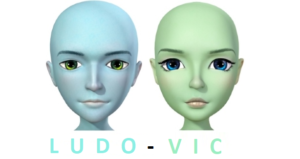
The working class districts of Paris, and more particularly the working class districts of the 18th, 19th and 20th arrondissements of Paris, now have a large proportion of inhabitants whose level of French is relatively low, which is a barrier to their social and professional integration. This is the observation made by Pôle Emploi, the Paris Local Mission, the “Espace Parisien d’insertion” and the PLIE de Paris. Indeed, these structures observe every day that learning French is the first need of their beneficiaries to which they must respond because French is a real barrier to access to employment. Access to employment is also an essential lever for the economic development of the “Investissement Territorial Intégré” of Paris.
However, today, local associations that provide support for learning French have a number of tools, but the effectiveness of these tools is not optimal and does not fully meet the needs of the inhabitants in terms of learning French.
The “BasicFrançais” application aims to strengthen the skills of these first, second or third generation migrant populations by helping them acquire the basics of French, initially based on the A1 level required by the French Office for Immigration and Integration, which is the minimum level necessary for successful integration into the world of work.
The associations mentioned above already have a number of tools at their disposal, but their effectiveness is not optimal. Thus, the recent report by MP Aurélien Taché established a critical assessment of the situation regarding these basic French language training courses, and proposes a number of areas for improvement with which the project is fully in line.
Indeed, our “basic français : a tool for integration & employability on the ITI districts” project proposes the development of a new tool that differs in several aspects:
It is a tool intended to be available both in class and for individual use, in order to strengthen the ability to repeat exercises outside the classroom, to reinforce learning.
It is a tool for the learner in his mother tongue, and in the oral form, thus breaking the wall of words and that of the national language. The instructions for using the tool are therefore translated and stated in the appropriate mother tongue.
The learning is based largely on animations that contextualize the language elements. They feature two avatars: Ludo- the male character – and Vic – the female character – chosen to avoid stigmatizing the target populations and to promote gender equality. Not only do learners record elements of French, but they also receive behavioural information: how a French citizen acts.
The project is innovative for its functionalities as well as for its response adapted to the specific needs of the inhabitants of the working class districts of the ITI territory of Paris in terms of learning French.
Thus the project aims to develop this tool for local associations in the ITI territory whose main missions are to learn French. Work has already begun on identifying these associations in the 18th arrondissement with the help of the Local Development Team of the 18th arrondissement of the City of Paris. This has made it possible to start developing links with the association “L’Ile aux langues”. The aim is not to limit ourselves to this association, but to be able to identify, with the help of the local development teams of the 18th, 19th and 20th arrondissements, other associations that can benefit from our tool, especially since they each have their own specificity either in terms of the content of the training provided or in terms of the target populations. It is this multiplicity of environments that will be used in the testing and loop development phase (“agile development”) integrating feedback. The project budget provides for the free provision of touch pads for associations in the priority working class districts of the 18th, 19th and 20th arrondissements to access the project’s developments in its various phases of progress.


